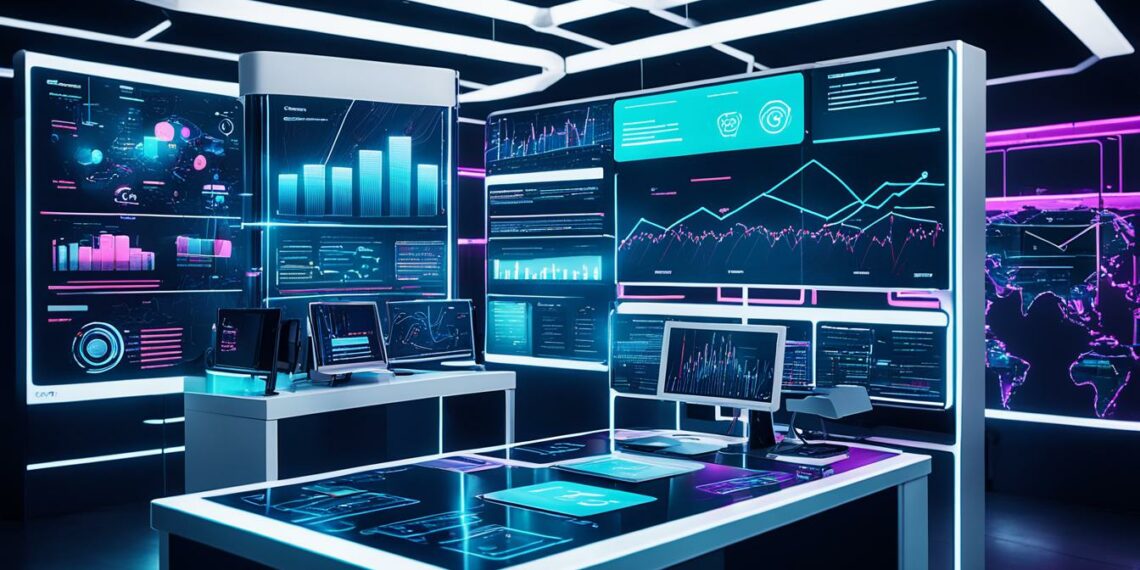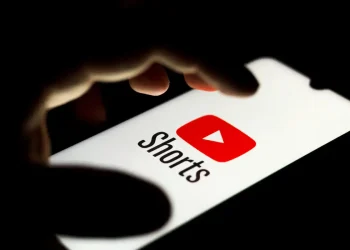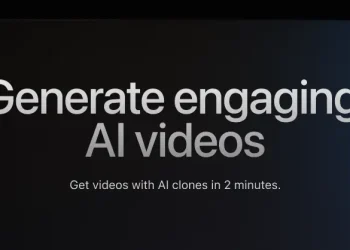Did you know the AI market in marketing was worth $15.84 billion in 2021? It’s expected to jump to over $107.5 billion by 2028. This shows how fast AI in digital marketing is changing. It’s changing how brands talk to customers and plan their strategies.
Even though 21% of marketers say AI is a big part of their work, 64% use AI tools. This shows AI’s big potential in digital marketing. It can make things better and create experiences that really connect with customers.
Looking deeper into this tech, we see how it makes things more personal, helps with work, and makes decisions based on data. AI is great at understanding what people feel, helping businesses know what customers like. By 2025, 95% of customer interactions will be powered by AI. Marketers need to get on board with these changes to keep up.
Key Takeaways
- The AI marketing industry is projected to grow from $15.84 billion in 2021 to over $107.5 billion by 2028.
- 64% of marketing professionals currently utilize AI tools in their jobs.
- AI aids in personalizing the customer experience, with 71% of marketers highlighting this benefit.
- 37% of organizations have begun implementing AI in some capacity, marking significant growth in adoption.
- AI’s financial impact in the marketing sector is anticipated to reach $2 trillion by 2030.
- 95% of customer interactions are expected to be powered by AI by 2025, illustrating a major shift toward automation.
- The top uses of AI among marketers include data analysis/reporting, research activities, and content creation.
Understanding AI in Digital Marketing
AI has changed how brands talk to consumers. It’s key for businesses to understand AI in marketing to make good strategies. By using machine learning and data, companies can improve how they talk to customers.
The Definition of AI in Digital Marketing
AI in digital marketing uses advanced tech to look at consumer data from places like social media and market trends. Tools like ChatGPT are leading this change, making marketing better. These AI tools look at past campaigns to see what worked best, helping brands make smart choices.
How AI is Revolutionizing Marketing Strategies
AI has a big impact on marketing. It can analyze competitors and help create content like headlines or articles. It also makes shopping more personal by offering tailored recommendations in real-time.
Companies like National Australia Bank use AI chatbots to quickly answer customer questions. This shows how AI is changing customer service to be faster and more personal. AI also creates detailed reports with visuals that show how to improve marketing.
Current Trends in AI for Digital Marketing
AI is changing the way we market products and services. Companies are seeing big changes thanks to new tech. Two big trends are the use of predictive analytics and chatbots in customer service.
Rise of Predictive Analytics
Predictive analytics is becoming key in marketing. It helps companies understand what customers will do next. By looking at past data, they can predict future actions.
This leads to better targeted marketing. It makes campaigns more effective and increases sales. In 2021, AI in marketing was worth $15.84 billion. By 2028, it’s expected to hit over $107.5 billion. This shows how important predictive analytics is for marketing.
Integration of Chatbots in Customer Service
Chatbots are another big thing in AI marketing. They make talking to customers faster and easier. They give quick answers, making things smoother for users.
Now, chatbots can even handle tricky questions. This is great for customers who like quick help. It makes customers happier and helps businesses run better.
The Impact of Machine Learning in Digital Marketing
Machine learning has changed how businesses talk to customers. It looks at lots of customer data to find patterns. This helps businesses target their marketing better, making more people buy things.
Improving Customer Segmentation with AI
Getting to know customers well is key to good marketing. Machine learning helps by sorting customers into groups based on things like who they are and what they buy. This way, companies can make ads that really speak to each person.
Automating Campaign Performance Analysis
AI is a big help in checking how ads are doing. It looks at how customers react to ads and what works best. This makes changing strategies faster and easier. With AI, ads get better and reach the right people at the right time.
Now, there are many AI tools out there, like those on AI generators. These tools make marketing work easier and cheaper. They help businesses reach their customers better, making everyone happier.
| Feature | Traditional Methods | AI-Driven Approaches |
|---|---|---|
| Customer Insights | Manual data analysis | Automated, real-time insights |
| Segmentation | Basic demographic grouping | Advanced behavioral and preference-based segmentation |
| Campaign Evaluation | Post-campaign analysis | Continuous performance tracking and optimization |
| Targeting Precision | Generalized outreach | Personalized, dynamic content delivery |
AI Tools for Marketing Success
The digital marketing world is changing fast. New AI tools are coming out to make things easier and more efficient. These tools help marketers focus on strategy and creativity. They automate the boring tasks. Let’s look at some top AI platforms marketers use and what they offer for making content.
Popular AI Platforms Used by Marketers
- HubSpot: Features an AI Assistant for content creation that integrates seamlessly with existing tools.
- Jasper: Offers content generation templates for various marketing needs, including social media posts and emails.
- Adobe’s Sensei: Provides powerful insights and data analytics to optimize marketing strategies.
- Sprout Social: Utilizes AI to process vast amounts of social media data, enhancing customer engagement.
- Bardeen.ai: Streamlines workflows by integrating over 100 other tools into one automation platform.
Benefits of AI-Driven Content Creation Tools
AI tools for making content are key for marketers who want to make great content fast. A recent survey found that 95% of marketers use AI to save time on manual tasks. They can then focus on what’s important in their jobs. These tools offer many features that are great for digital marketing.
| Tool Name | Key Features | Benefits |
|---|---|---|
| Jasper | Content templates, language options, and diverse fonts | Speeds up content production for various platforms |
| Keyword Insights | Content research, writing, and optimization | Improves content quality and alignment with SEO standards |
| LiveChatAI | AI chatbots for customer support | Enhances customer experience through prompt responses |
| Howler AI | Targeted press release campaigns | Optimizes journalist targeting for greater outreach |
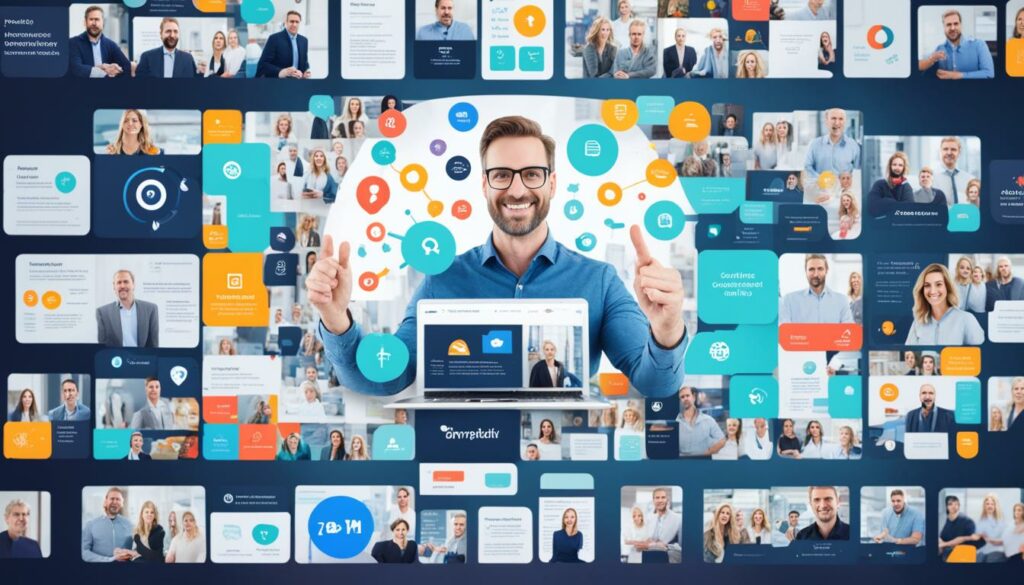
Using AI tools for marketing helps businesses stay ahead. They can give customers personalized experiences on different channels. By using digital marketing AI solutions, marketers can make, improve, and check campaigns. This meets the high standards of today’s consumers.
Benefits of AI in Marketing
Artificial Intelligence (AI) is now key in modern marketing. It does more than just automate tasks. It makes marketing more personal and effective. Companies using AI change how they talk to customers and make their campaigns better.
Enhanced Personalization for Users
One big plus of AI in marketing is making experiences more personal for users. AI looks at lots of data to find what people like. This helps businesses send messages and offers that really speak to people.
By sending the right content and ads, companies build stronger bonds with their customers. This leads to more people getting involved and sticking with the brand.
Improved Efficiency through Automation
AI makes marketing more efficient too. It helps with things like managing campaigns, checking how well they’re doing, and talking to customers. This lets marketing teams focus on big ideas and creativity.
AI gives real-time info on how customers are interacting. This lets brands quickly change their plans based on what people are doing.
Using AI in marketing helps find the best customers for offers. It also improves how marketing content is made and automates tasks like pay-per-click ads and social media. As companies keep using AI, digital marketing will keep changing. It will be shaped by better data and new tech uses.
AI Strategies for Digital Marketing
Using AI in digital marketing can change how brands run their campaigns. It helps refine targeting and improve messages by using data. AI tools make marketing more personal, which can lead to more engagement and loyalty from customers.
Creating Data-Driven Marketing Campaigns
Data-driven campaigns focus on analyzing customer data to make outreach better. AI helps marketers find the right demographics, like age and location, for their ads. Email is a key channel for marketers, with 29% seeing it as the most successful. For every $1 spent on email, there’s a big return of $42.
Utilizing AI to Foster Deeper Customer Engagement
AI boosts customer engagement by offering real-time personalization. Chatbots give tailored interactions and product tips, making the user experience better. AI-powered CRMs can group people based on how they interact, making marketing messages more personal.
Social media shows what consumers like and need. AI tracks these trends and keeps brands in touch with their audience. Tools like Adobe Experience Manager help pick content that grabs attention. With more people watching videos, AI makes these videos more personal based on what users like.
| AI Strategy | Description | Impact on Marketing |
|---|---|---|
| Data Analysis | Process customer data to identify patterns and preferences. | Enhanced targeting and messaging precision. |
| Email Optimization | Use AI to personalize subject lines and sending times. | Increased open rates and engagement levels. |
| AI Chatbots | Provide personalized customer interactions in real-time. | Improved customer satisfaction and retention. |
| Content Creation | Generate marketing content efficiently, from blogs to social posts. | Consistency and quality in messaging. |
Challenges in Implementing AI in Digital Marketing
Adding artificial intelligence to digital marketing has many benefits but also brings challenges. These challenges can affect how companies use AI in their strategies. One big worry is job loss in marketing. As AI takes over tasks once done by humans, there’s a rise in concerns about job cuts.
About 35% of marketers use AI in their work. But, the potential for automation could impact 400 to 800 million people worldwide by 2030.
Potential Job Displacement Concerns
Job loss in marketing is a big issue as AI makes processes faster. Around 64% of marketers think generative AI could hurt creativity, which is key in marketing. Yet, 36% believe it can boost creativity, but worries about changing or reducing it stay.
As AI takes over tasks like making content and automating customer interactions, workers might need to learn new skills. This could change their roles significantly.
Overcoming Integration Barriers with Existing Technologies
Adding AI can be tough because of barriers in current tech setups. Many marketers are moving towards automation, with 47% automating customer journeys. But, 88% see the value in using generative AI, and 67% warn against relying too much on it.
For AI to help without hurting creativity, companies need to update their systems and offer training. It’s crucial to overcome these integration challenges to keep innovation going without losing the skills of the workforce.
| Challenge | Details | Statistics |
|---|---|---|
| Job Displacement | Concerns about workforce reductions due to automation. Need for reskilling and upskilling. | 400-800 million individuals could be displaced by 2030. |
| Creativity Impact | Fears that generative AI will alter or hinder creativity in marketing campaigns. | 64% of marketers express concerns regarding generative AI’s impact on creativity. |
| Integration Challenges | Technological hurdles in implementing AI effectively within existing systems. | 47% of marketers have partially automated customer journeys. |
| Over-Reliance on AI | Significant caution against depending solely on AI tools for marketing strategies. | 67% of marketers believe over-reliance should be avoided. |
Future Predictions for AI in Digital Marketing
The digital marketing world is changing fast with AI. Voice assistants are getting more popular, making voice search optimization key for brands. Brands need to change their strategies to fit how people ask questions out loud. They must make content that matches how we talk, making it more relevant and engaging.
Increasing Dominance of Voice Search Optimization
AI-powered voice assistants are becoming more common. This means voice search optimization will be more important in digital plans. SEO needs to focus more on natural language and specific keywords. Marketers should study how people talk to make content that works well with voice searches, staying ahead in the changing market.
Emergence of Conversational AI Tools
Conversational AI tools are changing how brands talk to customers, making experiences more personal in real-time. These tools use big language models for deep, engaging talks between brands and customers. They help build stronger relationships. Marketers also get valuable insights, leading to better target strategies and understanding customers better.
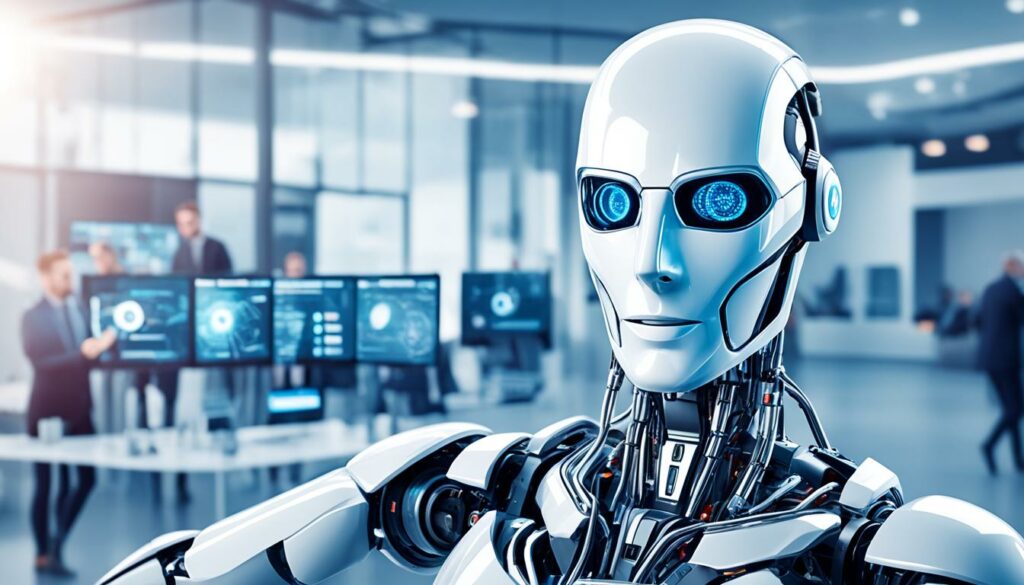
| AI Technology | Impact on Marketing | Usage Statistics |
|---|---|---|
| Voice Search Optimization | Enhances search relevance and engagement | 97% of mobile users utilize AI-powered voice assistants |
| Conversational AI Tools | Improves customer interactions and personalization | 70% of consumers prefer using chatbots for customer support |
| Predictive Analytics | Forecasts trends and informs marketing strategies | 61% of marketers see AI as a key component of their data strategy |
| Content Optimization Tools | Analyzes SEO factors and suggests improvements | 80% of business leaders claim AI has increased productivity |
Conclusion
AI is changing digital marketing in big ways. It makes marketing more personal, efficient, and effective. Brands use AI to get insights that help them make marketing plans that really speak to customers. This leads to happier customers and more loyalty.
Amazon and Spotify show how AI can make marketing special and engaging. They use AI to offer unique experiences that customers love. This helps them sell more and get more people involved.
The future of marketing with AI looks bright. AI makes doing marketing tasks faster and easier. This lets marketers work on big-picture stuff instead.
AI will play a bigger role in digital ads, like making email campaigns better and helping with customer service through chatbots. It’s key for brands to use AI to stay ahead.
AI is a must for businesses wanting to succeed online. It’s not just an option. Using AI will shape the future of marketing and help brands connect better with customers. For more on how AI is changing things, check out this resource on AI multimodality.
FAQ
What is AI in digital marketing?
AI in digital marketing uses machine learning and data to boost marketing and improve how we talk to customers.
How does artificial intelligence improve marketing strategies?
AI makes marketing better by using predictive analytics and optimizing ad targeting. It also makes campaigns more personal, leading to better results.
What are the benefits of using AI tools in marketing?
Using AI tools in marketing means more efficiency, better customer experiences, and more precise targeting. It also automates routine tasks, letting marketers focus on creativity.
Can you provide examples of AI tools used in marketing?
Sure! Popular AI tools for marketing include HubSpot for automation, Salesforce Einstein for data analysis, and Jasper and Writesonic for making content faster.
How is machine learning influencing customer segmentation?
Machine learning changes customer segmentation by looking at big data to find patterns. This helps marketers target better and increase sales.
What challenges do marketers face when integrating AI technologies?
Marketers might worry about losing jobs, the hard part of adding AI to current systems, and needing team training to use new tech well.
How does AI enhance personalization in marketing?
AI boosts personalization by studying user data to send content and ads that match what customers like. This builds stronger bonds with the audience.
What future trends are expected for AI in digital marketing?
The future of AI in digital marketing looks at voice search optimization and developing conversational AI tools. These will help with real-time, personalized chats with customers.
